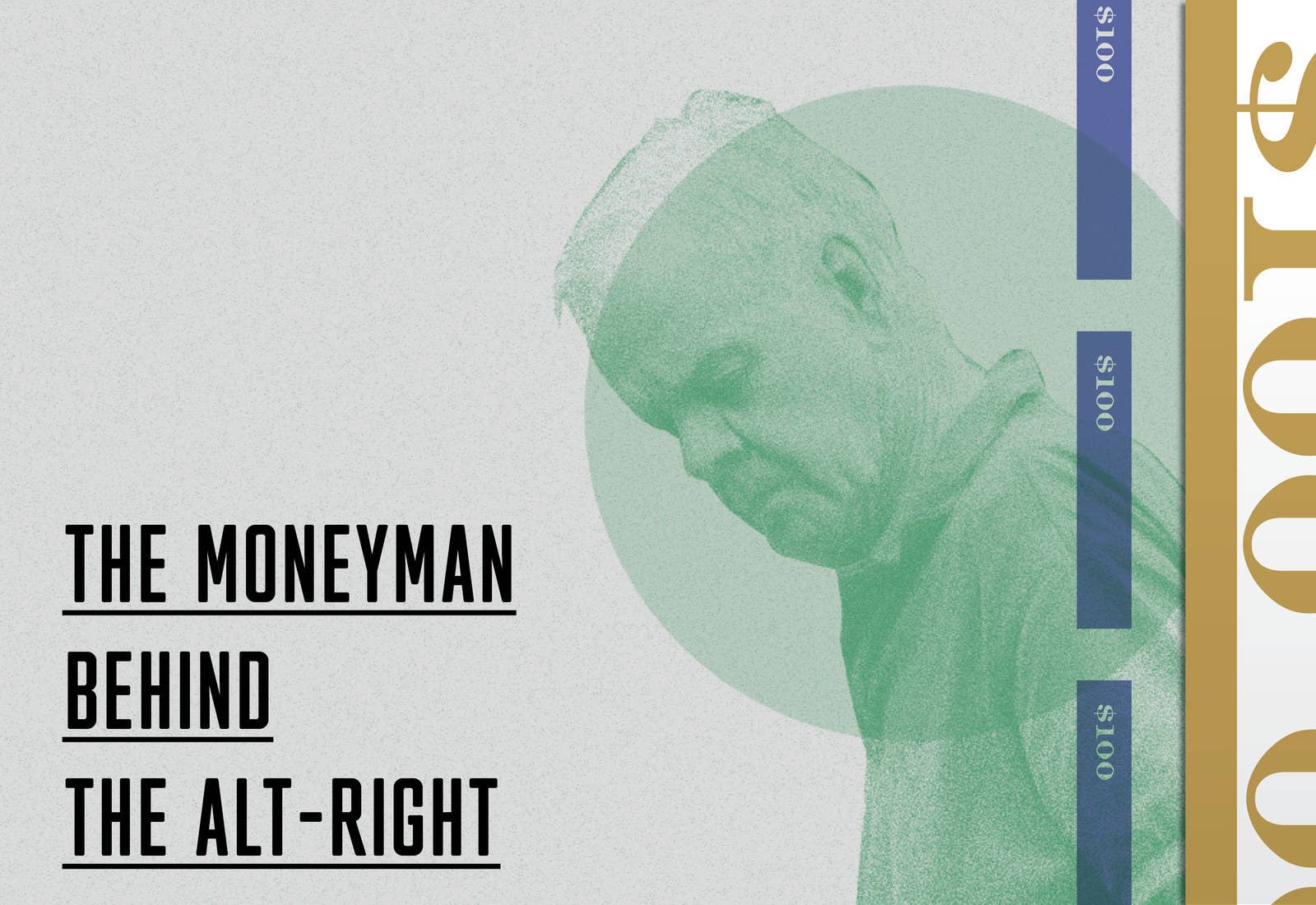He Spent Almost 20 Years Funding The Racist Right. It Finally Paid Off.

Regnery: Will Vragovic for BuzzFeed News
He's Spent Almost 20 Years Funding The Racist Right. It Finally Paid Off.
William Regnery II, a man who inherited millions but struggled in business, tried for 15 years to ignite a racist political movement — and failed. Then an unforeseen phenomenon named Donald Trump gave legitimacy to what Regnery had seeded long before: the alt-right. Now, the press-shy white separatist breaks his silence.
Posted on July 23, 2017, at 11:10 a.m.

Aram Roston
BuzzFeed News Reporter

Joel Anderson
BuzzFeed News Reporter
How did explicit racism move from a taboo to an open, unabashed force in American politics? A loose but sprawling internet army, often called the alt-right, gave white supremacy a massive megaphone. And with the rise of Donald Trump’s candidacy, it suddenly seemed to be everywhere at once.
In fact, that movement had an infrastructure — organizations, journals, conferences, money — that had been laid down years before. It was in large part funded by one person: a secretive and aging multimillionaire named William H. Regnery II, the most influential racist you’ve never heard of.
Despite inheriting immense wealth, growing up in a prominent family in the conservative movement, he had managed to chalk up virtually no public success in his first six decades of life. He never graduated from college, and he floundered in his attempt at running the family business.
But starting in 1999 — when he convened a dozen other middle-aged white nationalists at an ornate seaside hotel nicknamed the Pink Palace — he has poured hundreds of thousands of dollars into the quest to transform America and create what he calls a white “ethnostate.”
Regnery’s dream of an America separated completely by race seemed destined to end as just another of his failures.
His traceable donations have gone chiefly to two organizations, both of which he established and led as founding president. The first was the secretive Charles Martel Society, named for a leading figure of the European Middle Ages who fought off Muslim invaders. That organization helped create the second: the innocuously named National Policy institute, which became a nerve center of the alt-right. In 2011, Regnery hired Richard Spencer, the charismatic speaker widely credited with coining that term, to be the NPI’s president and director.
Still, for more than a decade and a half, Regnery’s investments and activism achieved no measurable results, and his dream of an America separated by race seemed destined to end as just another of his failures.
Until, that is, they were redeemed by an extraordinary historical event: the candidacy of Donald Trump. In a rare interview, Regnery reached for a word to describe the effect: “I think Trump was a legitimatizer,” he said. White nationalism “went from being conversation you could hold in a bathroom, to the front parlor.”
Suddenly, the seed money Regnery had doled out — often in small grants under $25,000 — started to show returns. The alt-right became a political force, trolling America with obscure philosophizing, pro-Trump messages, and outright racism, while Richard Spencer gave Regnery’s movement of aging white nationalists a clean-shaven, camera-ready face. Since Trump’s win, the movement has only gained prominence: A Nexis news archive search of the terms “Richard Spencer” and “alt-right” returns 1,200 results — all but 40 after the Nov. 8 presidential election.
Now, at 76, the long-ignored and rebuffed Regnery is savoring success as the alt-right commands ever more clout. "My support has produced a much greater bang for the buck than by the brothers Koch or Soros, Inc.,” Regnery boasted in a recent e-mail to BuzzFeed News.

Will Vragovic for BuzzFeed News
Bill Regnery in Boca Grande, Fla. on June 13, 2017.
THE SECRETIVE MILLIONAIRE SPEAKS
As much as he cultivates influence behind the scenes, Regnery avoids a public role and almost never speaks to reporters. But he agreed to meet in his hometown of Boca Grande, where he moved from Illinois. The white nationalist benefactor now lives the life of the retired grandfather there, staying fit by biking.
Nestled on a calm island just a mile across, connected by a toll bridge to the west coast of Florida, the town of 1,700 is an enclave of understated wealth for old-money families including the Bushes, the duPonts, and the Steinbrenners. Palm trees line the medians on Gilchrist Avenue right near the Gulf, and residents tool around in golf carts. The median home price is $1.3 million.
Got a tip? You can email tips@buzzfeed.com. To learn how to reach us securely, go to tips.buzzfeed.com.
One steamy May morning, in the fastidiously antique, vast parlor of the century-old Gasparilla Inn, the most expensive of the handful of hotels on the island, sunlight streamed in from the outside, and giant overhead fans pushed the musty air.
Regney sat in a cushioned wicker chair, browsing through clippings of the day’s news. Incongruously, he wore a bright yellow spandex biking shirt. When he stood to introduce himself, his hand trembled as he offered it.
“Bill,” he said, introducing himself.
He’s frail and a bit bent, with thinning white hair and bushy eyebrows, but he is still spry, and announced plans for a 15-mile bike ride as soon as the interview was over. Speaking about a wide range of subjects, he folded his legs and looked off into the distance, wearing a serious expression and avoiding eye contact. When the questions got personal, about his family, for example, or his perceived failings, he answered calmly, but began clicking his ball point pen, in and out, in and out.
For the first quarter hour, the subject of race did not come up. Then suddenly he introduced it. “I’m not all that race conscious,” he said, brightly at first. “I say ‘vive le difference!’”
“I’m most comfortable around Europeans,” he went on, as if describing a preference for tweed suits rather than twill. But soon his preoccupation got serious, “I just like living around people with whom I’m most comfortable, and that’s white.”
“I just like living around people with whom I’m most comfortable, and that’s white.”
Soon he corrected himself. “Yes, I’m race conscious,” he said. “In my ethno state,” he explained, “I would exclude, as a rule of thumb, non-whites, non-Europeans, wherever, however you want to define them. So, that includes blacks. We keep getting back to blacks, but we've got to throw in Han-Chinese, have to throw in Amerindians, people who are distinctly different.”
In a subsequent email, he said that even without any laws in place, the process of total segregation is further along than most people are willing to admit: "Ironically, on a sublimated basis, most white Americans, left included vote quietly with their feet and occupy segregated neighborhoods where their children attend lily white schools with a few Asians tossed in for verisimilitude.
Asked whether he considers Jews to be white, Regnery cocked his head and said, “That’s a good question!” Turning to “racial science,” he said that DNA shows Ashkenazi Jews are half white, while Sephardic Jews are not white at all. If he ever gets his ethnostate, he said, he might allow some Jews to live there, but not others. He joked that Paul Gottfried, one of his Jewish allies years ago, would be OK.
What would happen to those excluded from his ethnostate? He didn’t really say, nor did he truly address the underlying premise of his dream: massive violence and ethnic cleansing. This will all happen, he insisted, “by consent.”
How? It's hard to get a clear answer on that, or on any other of his remarkable positions. Not in person, where Regnery tried to deflect many questions, nor even in email, a medium in which he seems more comfortable, meandering down philosophical and historical byways. In one response to a question from BuzzFeed News, Regnery wrote:
I define a man of the left as a cultural universalist and social egalitarian. I, on the other hand, am a cultural particularist and social pluralist; I applaud a variety of cultures each populated by their discrete swath of humanity. I do not support world improvers who seek dominion over others in the name of a utopian ideal. Personally, I am most comfortable not only among my tribe but more specifically with members who agree with Robert Frost that “good fences make good neighbors.
His response went on in this vein for three more paragraphs, veering from Amish Rumspringa to "an elected denaturalization council" to Vladimir Lenin to Woodrow Wilson to John Maynard Keynes, ending with an observation of the Casablanca Conference. It was a response, ostensibly, to the question "Do you admire or sympathize with the Nazi efforts?"
Ralph Morse / The LIFE Images Collection / Getty Images
America First Committee's isolationist rally at Madison Square Garden, Oct. 30, 1941.
NEW LIFE FOR AN OLD IDEA
“America First,” Trump announced during his campaign, “will be the major and overriding theme of my administration." It was a phrase he has deployed repeatedly and to great effect.
But 77 years ago, the phrase “America First” had another distinctive meaning: It was the name of the organization formed to prevent the US from entering World War II and battling the Nazis. One of the America First Committee’s chief financiers was Regnery’s grandfather and namesake, the first William Regnery, who was born on a farm in Iowa and became a textile magnate, banker, and philanthropist in Chicago. The face of the original America First movement was Charles Lindbergh, better known for making the first solo nonstop flight across the Atlantic Ocean in 1927 but who earned a reputation as an anti-semite. “Our bond with Europe is a bond of race and not of political ideology,” he said in a 1941 address.
There are no published writings by the elder William Regnery, and little record to know exactly why he financed the American First Committee. Bill Regnery, who was born in February 1941, said he has little memory of his grandfather. But Spencer told BuzzFeed News that the American First Committee is “absolutely” an intellectual and political forebear for today’s alt-right. “I agree with liberals who say that American First line has racial connotations. I think it clearly does,” Spencer said.
After the war, in 1947, Bill’s uncle Henry launched what would become one of the longest-lasting and most influential conservative publishing houses in the country, Regnery Publishing, which went on to publish William F. Buckley and other pillars of the modern conservative movement.






